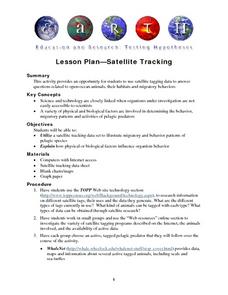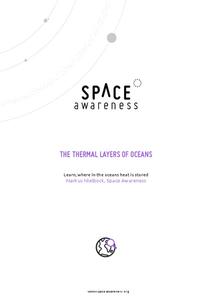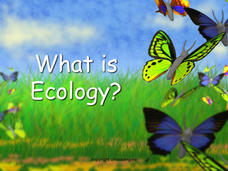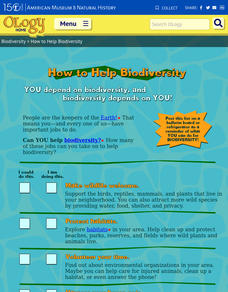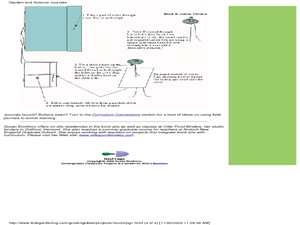Curated OER
What is Diversity of Life?
Students are introduced to the variety of organisms in our world. this lesson is a part of a multi-segmented unit on specie diversity. this segment explores distribution of life on land and sea.
Curated OER
Satellite Tracking
Students apply satellite tagging data to investigate questions related to open-ocean animals, their habitats, and their migratory behaviors. They determine how physical or biological factors determine organism behavior using a data...
Curated OER
Seas Of Life
Middle schoolers brainstorm examples of predator and prey that are featured in a video they watch. In this investigative lesson students will research an animal from the video and explain if it is a predator or prey and how it...
Curated OER
Exploring Habitats
Students analyze the difference between the human habitat and the different habitats of animals in the six lessons of this unit. The students' imaginations and literature are used to explore important aspects of the living environments...
Curated OER
Science: Making Career Connections
Students explore careers in oceanography. They compare and contrast requirements for careers in the field, and determine what high school courses would help to prepare them. Finally, they create a computer-based project related to...
Curated OER
Aquatic Organisms and Their Habitats
Students investigate the presence of specific organisms in a freshwater habitat to determine the quality of that habitat. They conduct a field study and distinguish and classify organisms found during the field study.
Curated OER
Habitats and Adaptations
Young scholars research and describe the habitat and adaptations of a reef animal. After the student is assigned a habitat, they design and draw a cresture adapted to eat each food and to live in each habitat.
Curated OER
Historical Harbor Habitats
Tenth graders create food web displays in the classroom. In this ecology lesson, 10th graders identify the different pollutants in the environment and their effect on organisms. They collect samples of sediments from the harbor and...
Curated OER
Habitats
Young scholars complete food chains for organisms in three environments. They use copies of the Habitat worksheet. Students review the food chain terms with the teacher. They research related food chains, and interlink these to form a...
Curated OER
Ocean Habitats:
Students investigate the creatures of intertidal zones. They explore the adaptations species make to survive .
Curated OER
Marine Protected Areas (MPA)
Ninth graders explain the purpose of MPA's. For this biology lesson, 9th graders identify MPA's in Southern California. They simulate coastal sampling using candy from two buckets. Students analyze their results and share it with the class.
American Physiological Society
What Environmental Conditions Lead to the Hatching of Brine Shrimp?
Will changing the environment in which brine shrimp live impact their reproductive success? Young scientists get hands-on experience studying the habitat of brine shrimp in a two-week immersion lesson. The teacher's guide provides all of...
American Museum of Natural History
Going, Going...Gone?
Young environmentalists consider how scientists are attempting to save endangered species. They read about what causes extinction and steps to take to minimize the threats.
Space Awareness
The Thermal Layers of Oceans
How much does the sun heat up a lake or ocean? Scholars use a cup and a strong lamp to investigate the heat transfer and thermal layers in the ocean to come up with the answer. They collect data and graph it in order to better understand...
Biology Junction
What Is Ecology?
Do you know the name for the biological study of interactions? A short presentation with accompanying worksheet introduces individuals to ecology. The materials offer a broad overview of the subject and the levels of organization to...
ReadWriteThink
Webcams in the Classroom: Animal Inquiry and Observation
Boost observational skills with an inquiry-based lesson that takes scholars on a virtual field trip. With help from webcams, learners observe animals in a zoo or aquarium. Observations go into a journal and a discussion is held to review...
Curated OER
Dream Stream
Investigate the parts of a healthy stream to build content-specific vocabulary and ecological awareness. The class builds vocabulary and determines why clean water is important for trout. They design a shoe box to show what a clean...
American Museum of Natural History
Endangered Species Game
Multiple factors affect the survival of endangered species. A hands-on activity has learners explore those factors. They play a board game that highlights factors such as human influence, habitat availability, and new species introduction.
American Museum of Natural History
How to Help Biodiversity
A resource provides a checklist of nine actions for pupils to take to do their part in supporting biodiversity. The list suggests more obvious actions such as supporting wildlife to less obvious ideas like learning about different...
Curated OER
Native Species Restoration: Is Saving One Species Hurting Another?
Students investigate the effect of human activities upon the environment. The studying experience encourages students to think about the issues involved in native species restoration.
Curated OER
Cicada Invasion
Students consider how some animals, periodical cicadas, survive well in a particular environment due to the species' life cycle. They have a discussion about life cycles and how a particular species' life cycle helps it to survive....
Curated OER
Biodiversity
Fifth graders visit the playground to look for signs of life. They search for insects, birds, animal tracks, feathers, nests, trees, soil, etc. They then compose a class list that shows all findings in the schoolyard and post it in the...
Curated OER
Adaptation and Diversity on Sheffield Island
Written for an exploration of shoreline ecosystems on Sheffield Island, this gives ecology or marine biology buffs a hands-on experience. Using GPS or visual triangulation techniques, they lay transect lines on a high and a low energy...
Curated OER
Making Field Journals
Students follow a bookmaking format to create a book and use it as a garden journal. In this science journal lesson, students follow book making directions to create a garden and science journal.



